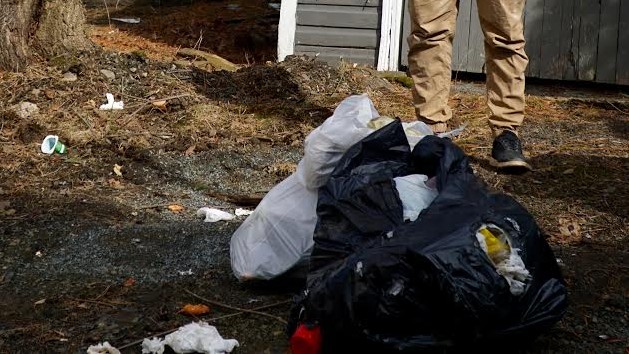Halifax considering big fines for trash dumpers
New illegal dumping prevention measures could also include more officers on patrol

caption
Keigan Davis stands near trash that was illegally dumped on his property in Halifax.People who dump garbage illegally could face steeper fines, as the city makes plans to scale up enforcement.
The environment and sustainability standing committee voted unanimously Thursday to begin updating the Halifax Regional Municipality’s illegal dumping prevention strategy.
The decision comes in the wake of a staff report that highlighted the problem. Illegal dumping includes littering, as well as abandoning larger amounts of garbage or recycling.
“I’m so frustrated to hear that when we go to hike with our dogs and our friends and what do we see? Illegal dumping,” Coun. Tony Mancini said in the meeting.
Illegal dumping currently carries a $237.50 fine. The prevention measures under consideration include increased fines and scaling up existing public awareness campaigns. Other options include increased funding for Halifax Regional Police patrols, to hire more officers and RCMP to work and patrol at times when illegal dumping is most common, such as late at night.
“Nothing burns my biscuits more than [illegal dumping],” said Coun. Lisa Blackburn during the meeting. “First of all, it’s ridiculous that we have to even be doing this. It’s all about the name and shame. Let’s jack up the fine as high as possible and make these guys learn.”
The committee hopes to emulate the Cape Breton Regional Municipality, where fines for illegal dumping range from $697.50 to $5,000.
The stricter penalties were implemented in 2018. They have not put a stop to littering, but the changes have helped, said the education co-ordinator for CBRM’s solid waste department.
Roschell Clarke said the key factors were the hiring of a full-time police constable to enforce the new rules and public education programs explaining curbside collection processes and proper disposal methods.
“There is a great sense of awareness in our community that if a citizen illegally dumps, it will be acted upon and followed upon,” Clarke said in an interview. “Having a constable do this type of work for us actually helps the person who is dumping actually realize how serious dumping is and the potential consequences that are associated with the activity.”
Kirk Symonds, with Environmental Services Association Maritimes, said implementing a similar strategy in Halifax would also reduce cleanup costs. The association promotes sustainable living and is against illegal dumping.
“For more than 50 per cent of illegal dumping sites, the taxpayers pay the price to clean them,” Symonds said. “We’re talking tens of thousands of tax dollars per year going toward dealing with illegal dumping.”
In Halifax’s south end, homeowner Keigan Davis has been forced to clean up piles of garbage dumped around his property several times this year. He hopes stricter rules will make the offenders think twice.
“It’s unfortunate that I need to clean up someone else’s mess on my property,” Davis said. “I’m annoyed that whoever did this wasn’t held accountable.”
Jacques Dubé, HRM’s chief administrative officer, will develop a set of possible new bylaws for council’s approval, within the year.
About the author

Josh Neufeldt
The resident esports enthusiast of King's journalism. 4th year with an affinity for gaming, movies and food.

Will McLernon
Will McLernon is a journalist with The Signal. He is currently finishing up his Bachelor of Journalism (Honours) degree with a minor in International...